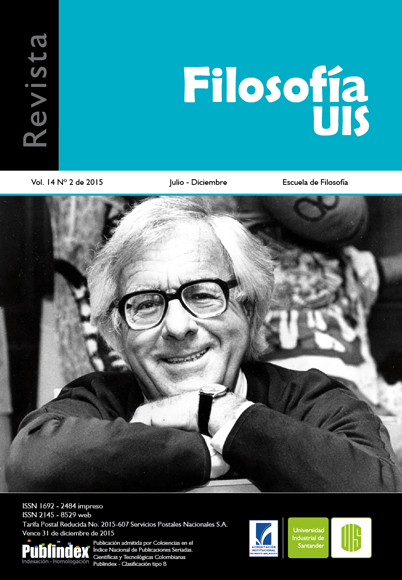Capitalism, guilt and redemption. (About the spiritual foundation of the metro-polis)
Published 2015-12-03
Keywords
- Resistance,
- memory,
- tradition,
- capitalism,
- city
How to Cite
Copyright (c) 2015 Camilo Alfonso Salazar Flórez

This work is licensed under a Creative Commons Attribution 4.0 International License.
Abstract
This paper exposes a critic to the called ‘historical memory’. The activity of recalling the ‘forgettable’ has been postulated as an anti-capitalist action meant by itself. Because his ‘origins’ oblivion, the city’s inhabitant is accused of lacking authenticity. However, a conceptual analysis of these subjectivities in dispute notices that their opposition is only apparent: they both are part of the new formal unit of capitalism. The subject, who convene his ‘ancestors’, and the one who is constantly moving (capital) are now the form of a same subject. Both the traditional city, which we will relate to the action of recalling (from being determined), and the cosmo-polis, related to the capitalist processes of eroded limits (the city that rests on itself), are no longer sustainable. It is the Metro-polis (and its creatures), which overflows his footage, which can conjugate both moments: Then, what was presented as a resistance against capitalism is also seen as belonging to it in an intimate way.
Downloads
References
- Agamben, G. (2011). “Creación y salvación” . Giorgio Agamben. Desnudez. Buenos Aires: Adriana Hidalgo.
- Bataille, G. (1992). El erotismo. Barcelona : Tusquets.
- Benjamin, W. (2006). “El origen del ‘Trauerspiel’ alemán”. Walter Benjamin. Obras, Libro I/vol. I. Madrid Abada .
- Benjamin, W. (2008). El narrador. Santiago de Chile: Metales Pesados.
- Benjamin, W. (2010). “Hacía la crítica de la violencia”. Walter Benjamin. Obras, Libro II/vol. I. Madrid: Abada.
- Caillois, R. (1959). L´homme et le sacré. París: Gallimard.
- Devries, W.A. (2008). “Sense-certainty and the ‘this-such’” en Moyar, D. y Quante, M. Hegel’s Phenomenology of Spirit. Cambridge: Cambridge University Press.
- Foucault, M. (2005). Historia de la sexualidad. V.1. La voluntad de saber. Madrid: Siglo XXI.
- Franklin, B. (2004). “Advice to a Young Tradesman, Writen by an Old One”. En Houston, A. Franklin, the autobiography and other writings on politics, economics, and virtue. Cambridge: Cambridge University Press.
- Han, B-C. (2012). La sociedad del cansancio. Barcelona: Herder.
- Han, B-C. (2014). La agonía del eros. Barcelona: Herder.
- Hegel, F.G.W. (2006). Fenomenología del espíritu. Valencia: Pre-textos.
- Heidegger, M. (1996). Schelling y la libertad humana. Caracas: Monte Avila.
- Heidegger, M. (2006). Ser y tiempo. Madrid: Trotta.
- Houellebecq, M. (2009). Las partículas elementales. Barcelona: Anagrama.
- Kierkegaard, S. (2004). Tratado de la desesperación. Buenos Aires: Leviatán.
- Kristeva, J. (2006). Historias de amor. México D.F: Siglo XXI.
- Lear, J. (1990). Love and its place in nature. New Haven: Yale University Press.
- Michelet, J. (2014). La bruja. Un estudio de las supersticiones en la edad media. Madrid: Akal.
- Rosenzweig, F. (1997). La estrella de la Redención. Salamanca: Sígueme.
- Roudinesco, E. (2006). La familia en desorden. México D.F.: Fondo de Cultura Económica.
- Roudinesco, E. (2009). Nuestro lado oscuro. Una historia de los perversos. Barcelona: Anagrama.
- Sartre, J.P. (2009). El existencialismo es un humanismo. Barcelona: Edhasa.
- Žižek, S. (2012). Less than nothing, Hegel and the shadow of dialectical materialism. Londres: Verso.
- Zuleta, E. (1985). El pensamiento psicoanalítico. Medellín: Percepción.
